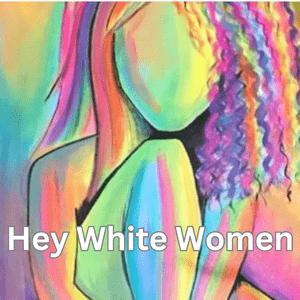Content warnings: Racism, white supremacy, police violence (Philando Castile referenced), ICE and immigration enforcement, genocide of Indigenous people, slavery, cult abuse (rape/torture/murder referenced generally), suicide (referenced generally), war/imperialism.
Daniella and Rebecca begin by talking about weather disruptions and how infrastructure failures, especially in majority-Black areas, reflect systemic racism and neglect. From there, they zoom out into a larger conversation about white America "waking up" only when systems start affecting them directly, and how that delayed awakening is both infuriating and dangerous because it can become a temporary moment rather than lasting change.
They explore whiteness as a cult-like system built on dehumanization, denial, and thought-stopping clichés. Rebecca emphasizes that waking up does not come with absolution, and that journaling and self-interrogation are necessary before asking marginalized people to do emotional labor. Daniella connects this to cult-exit frameworks, noting that people leaving harmful systems often need a soft landing to avoid being pushed back into the same cult, but that victims are never obligated to provide that.
They also discuss how capitalism functions as a belief system that dehumanizes people through productivity metrics and profitability, and how creative practices like fiber arts can be anti-capitalist acts of joy. Throughout, both emphasize that growth requires accepting misunderstanding, discomfort, and the fact that people change over time, including public intellectuals and leaders.
CONNECT WITH REBECCA
• Website: https://www.whitewomanwhisperer.com
• YouTube: https://www.youtube.com/@thewhitewomanwhisperer
• TikTok: https://www.tiktok.com/@white_woman_whisperer
CONNECT WITH DANIELLA
• Order Culting of America: https://knittingcultlady.com/products/the-culting-of-america
• Autographed copy of Uncultured: https://uncultureyourself.com/pages/uncultured-autographed
• From Bookshop.org: https://bookshop.org/a/104058/9781250280114
• Daniella's Patreon: https://www.patreon.com/GroupBehaviorGal
• Daniella's TikTok: https://bit.ly/4muxbu6 (@knittingcultladychat)
• YouTube: https://www.youtube.com/channel/UCuFRBZ2w3QsYs7Km69keHsg
• Instagram: https://www.instagram.com/stories/daniellamyoung_/
• Hey White Women Podcast: https://tr.ee/2gWVBFaYnp
• Cults and the Culting of America Podcast: https://sites.libsyn.com/534892/site
• White Women Get Ready: https://www.mistresssyndrome.com/book
KEY TAKEAWAYS
• Infrastructure and public services failures often track racialized neglect, not just "bad luck" or weather
• White America frequently "wakes up" only when harm reaches them personally
• The danger of focusing only on ICE, or any single symptom, is that people may go back to sleep when the crisis feels less urgent
• Whiteness functions like a cult: dehumanization, denial, scripts, and fear-based social control
• Waking up from a cult does not come with "ultimate absolution" for harm done while inside it
• Journaling and self-interrogation are necessary before demanding answers or emotional labor from marginalized people
• Forgiveness is not the same as accountability; changed behavior is the only meaningful evidence
• Cult-exit frameworks show that "soft landings" reduce the risk of relapse, but victims are not obligated to provide that landing
• Capitalism acts like a belief system that reduces humans to productivity and profitability
• Joy-based art and fiber crafts can be anti-capitalist resistance because they reject "usefulness" as the main value
• Being misunderstood is part of growth; over-explaining often becomes another form of insult or defensiveness
• People, including leaders and experts, change over time, and society needs to make room for that without demanding perfection
CHAPTERS
00:00 Surviving the Storm: A Personal Reflection
01:45 Racism in Education: A Systemic Issue
04:18 The Awakening: Understanding Black Lives Matter
09:19 Confronting White Apathy: A Call to Action
13:04 The Cult of Whiteness: A Personal Journey
17:01 Questioning Cultural Norms: The Role of Language
19:15 The Value of Frivolity: Anti-Capitalist Perspectives
22:53 Empathy in the Face of Dehumanization
26:30 The Complexity of War and Propaganda
28:09 Navigating Privilege and Audience
29:40 Understanding Cult Dynamics and Survivor Needs
31:54 Expertise vs. Learning: The Dual Journey
34:13 The Evolution of Thought and Public Discourse
36:54 The Myth of Perfection in Leaders
38:56 Embracing Change and Growth
41:54 The Fear of Standing Out
45:13 Identity and Belonging in a Cult Context
48:22 Forgiveness and Understanding in Healing
50:26 The Role of Society in Shaping Narratives
52:15 Awakening to Reality
55:31 The Role of Education in Change
57:53 Embracing Embarrassment and Growth
01:00:34 Finding Your Role in the Revolution
01:03:31 Community and Parenting in Modern Society
01:07:13 The Illusion of Community in White America
01:10:46 Deconstructing Whiteness and Identity
01:14:02 The Journey of Learning and Growth
Produced by Haley Phillips


